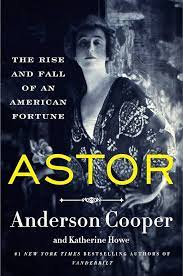I like asking high school students and young adults, “Who do you want to be?” Of course, this is an impossibly hard question for anyone, but especially for a high school student. However, without fail, they answer with what they want to do. It takes a bit of time before they even understand the question. It seems to me that few people think about this question very deeply.
A TALE OF TWO FAMILIES
I just finished listening to The Search For God and Guinness: A Biography of the Beer That Changed the World by Stephen Mansfield, and we are halfway through The Astor: The Rise and Fall of an American Fortune by Anderson Cooper and Katherine Howe. These books present a sharp contrast between two different men and two different families. Arthur Guinness (1725-1803) founded the Guinness Brewery at St. James’s Gate, and John Jacob Astor (1763-1848) began as a fur trader and later became a New York real estate mogul. Both men were very successful in amassing fortunes and passing them down to future generations.
are halfway through The Astor: The Rise and Fall of an American Fortune by Anderson Cooper and Katherine Howe. These books present a sharp contrast between two different men and two different families. Arthur Guinness (1725-1803) founded the Guinness Brewery at St. James’s Gate, and John Jacob Astor (1763-1848) began as a fur trader and later became a New York real estate mogul. Both men were very successful in amassing fortunes and passing them down to future generations.
Arthur Guinness was a man of deep faith in Jesus Christ and that faith was lived out in the business he founded. Arthur Guinness founded the first Sunday schools in Ireland which took children off the streets and taught not only about God, but reading and writing. He fought against the practice of dueling and chaired the board of the hospital for the poor. The Guinness Brewery routinely paid wages that were 10 to 20 percent higher than average and had the reputation as the best place to work in Ireland. He also passed down his faith and morals to successive generations. Edward Cecil Guinness, great-grandson of Arthur, said, “You cannot make money from people unless you are willing for people to make money from you.” A Guinness worker during the 1920s enjoyed full medical and dental care, massage services, reading rooms, subsidized meals, a company-funded pension, subsidies for funeral expenses, educational benefits, sports facilities, free concerts, lectures and entertainment, and a guaranteed two pints of Guinness beer a day. In 1900 Guinness employed Dr. John Lumsden as its chief medical officer.
 He visited thousands of Dublin homes in 1900 and used his knowledge to help the company fight disease, squalor, and ignorance. Dr. Lumsden’s efforts led to the Irish version of the Red Cross, for which Dr. Lumsden was knighted by King George V. These efforts came at an enormous cost to company profits.
He visited thousands of Dublin homes in 1900 and used his knowledge to help the company fight disease, squalor, and ignorance. Dr. Lumsden’s efforts led to the Irish version of the Red Cross, for which Dr. Lumsden was knighted by King George V. These efforts came at an enormous cost to company profits.
By contrast, John Jacob Astor and his descendants seemed to care only for profit, prestige, and reputation. By all accounts, John Jacob and his descendants were greedy, vain, and immoral. John Jacob Astor is quoted as saying, “I don’t mind religion, but it has nothing to do with business.” In contrast, Arthur believed that his faith was lived out in his business. Both families had to deal with very difficult misfortunes and tragedies. The Guinnesses were not saints and the Astors were not all villains. But the two books and contrasting families allow me the opportunity to ask the question, “What kind of person do I want to be?” If someone were to write a book about my life, would the story look more like the Guinness story or the Astor story?
A STORY IN PROGRESS
Of course, it is doubtful that anyone will ever write my story, but if they did, would they write about a man who was humble, generous, forgiving, and the first to greet people as they pass walking down a street? Would they write about someone kind and thoughtful of others, and someone who understands that the customer service representative who is not helpful is someone who makes minimum wage and is just trying to do their job? Would they write about a husband and a father who was not perfect but always did his best to love his wife and his children well? Naturally, if my story was told well, it would also include times when I was thoughtless, selfish, and greedy. I am far from perfect. But I wonder what events others would recall.
I am a missionary with Cadence International, a pastor, and a high school teacher. But these are things I do, not who I am. I am not qualified to write who I am, but I know that who I am is more important than what I do. Who I am is in my character, my soul, and my heart as it is lived out in the choices I make every day in public and private.
I pray that you will think carefully and honestly about what kind of person you are; it isn’t easy. The truth is disturbing. But more importantly, I hope you will think about what kind of person you want to be and take steps to be that person.